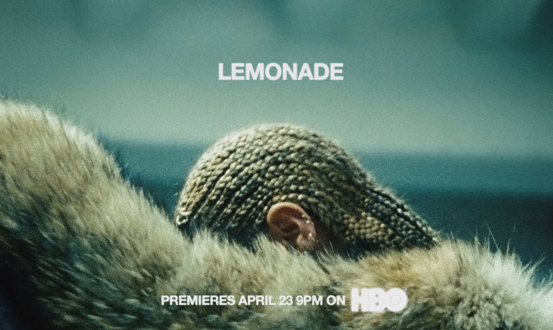Beyonce’s “Lemonade”

Beyonce’s Album
We’ve all heard the refrain “when life gives you lemons, make lemonade”- a cute and understated delivery of a message of positivity despite unfavorable circumstances; however after being adapted by Beyoncé Knowles Carter, we are left with something entirely more powerful. The pop goddess’ sixth studio album, which debuted at number one on the charts, has left listeners stunned by its fearless expression of empowerment, and seamless combination of the visual and the auditory (not to mention the hot celebrity gossip). This “visual album”– a cinematic production placed on top of the music itself– was released practically unannounced, suddenly airing April 23rd on HBO for those in-the-know. As for the rest, it can currently be streamed on Tidal, and will likely be available on other music-sharing platforms in the near future.
The one-sentence summary of Beyoncé’s Lemonade that seems to be circulating is that “it’s about Jay-Z cheating on her.” This is certainly a prominent and intriguing aspect of the album, but it does not merely paint the whole picture. A dedicated viewing of the work reveals that its thematic scope is far wider than personal drama, taking on the role of black women in America, and their ceaseless quest for acceptance, both internal and external (but more on this later).
A dedicated viewing is indeed what is owed by all to this masterpiece, for no one could possibly do justice with a mere description of the one-hour journey that Beyoncé takes us on. The cinematography is nothing short of Hollywood blockbuster caliber, providing a wealth of intensely imaginative settings, striking costumes, and surreal screenplay. As holds true for any project with Beyoncé’s name on it, the signature choreography, involving supporting roles from all walks of life, works to illustrate the story behind the music, and reinforces that this well-rounded performer is much more than just a singer.
The visual aspect of this album truly adds a new dimension of emotional appeal and entertainment quality; however this is not to say that the music itself is in any sense lacking. The range in tone and genre across the LP is as far-reaching as the feelings one experiences in enduring the relational rollercoaster Beyoncé signs of. Pain, disbelief, anger, recovery, and hope are all outlined with infectious hooks and raw vocal passion on top of intelligently-written compositions in the style of R&B, Hip Hop, Rock, and Country. It is a true feat when one release can evoke laughter, tears, and everything in between, while still managing to feel concise and cohesive.
When evaluating any individual aspect of this album, its merit is enough to earn it world-class status; however its value is much greater than the sum of its parts. This work is art in its truest form- one that enlightens both the individual and society. The American public has an insatiable desire to know the personal details of its celebrities, which even this uncharacteristically revealing album cannot quench. An obsession has been brought about by the provocative insights given into this star’s love life- Will they be getting a divorce? With whom did Jay-Z cheat? Did he really cheat? The truth of the matter is, (as long as you aren’t a tabloid writer), that this information is largely irrelevant. Beyoncé is not speaking about her life because she wishes us to consider her, but rather ourselves, and specifically the black women of the country. When distracted by gossip, the truth that this album is one of the most empowering feminist statements to date becomes obscured. A situation of infidelity is so beautifully used to create a parallel with society’s most pressing issues, and illustrate the necessity for all black women– likely the most marginalized group in the country– to find a source of strength, and a capacity to forgive. Her art delivers this message in a way that no other medium could; the palpable insecurity in the first third, the anger and bitterness in the second, and the light of hope in the last submerge the viewer/listener in a world untouchable by conventional communication. In each word of the chilling poetry recited in between each track, the stages of grief are eloquently outlined, starting from denial and working up to forgiveness and hope for the future. These messages apply perfectly to the apparent relational difficulty being faced by Beyoncé, but equally as powerfully speak of the struggle faced by every black woman. Society has done, and continues to do its damage, using oppression to leave every justification for anger and hatred, yet women are called on to do what requires more strength than all else: forgive, and continue to love despite the hardship.
It seems cruel to rejoice at the pain of such an esteemed icon, but without it, such important art as Lemonade may have never seen the light of day, and people all across the globe would live without instructions on how to “let their torturer become their remedy.”


Zula Oliveira • May 18, 2016 at 7:08 pm
AMAZING article! It truly captures Mrs. Carter’s POWERFUL message!